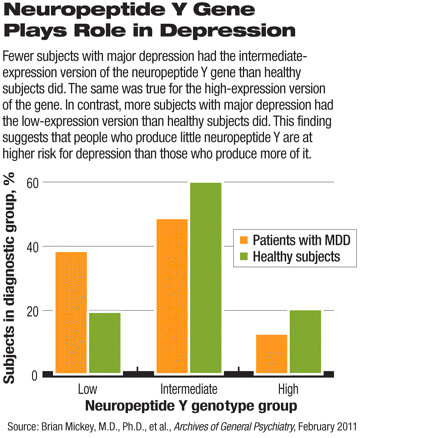Neuropeptide Y is a neurotransmitter that is widely distributed in the brain and expressed at high concentrations. There is growing evidence that it plays a role in both stress and depression.
For example, animal experiments have shown that stress releases neuropeptide Y in the amygdala. High blood levels of neuropeptide Y have been linked with resilience to psychological stress in humans. Conversely, low neuropeptide Y concentrations in blood, cerebrospinal fluid, and postmortem tissue have been linked with mood disorders.
Now a new study has found that people who produce little neuropeptide Y are more susceptible to stress and depression than are people who produce a lot of it.
The lead investigator was Brian Mickey, M.D., Ph.D., an assistant professor of psychiatry at the University of Michigan. Results appeared in the February Archives of General Psychiatry.
In the first leg of this study, 58 healthy subjects were genotyped as to whether they had a version of the neuropeptide Y gene that makes little neuropeptide Y, a moderate amount of neuropeptide Y, or a lot of neuropeptide Y. The researchers then exposed the subjects to negative words and used neuroimaging to see how subjects' brains responded to the words. The brains of subjects with the low-expression version of the gene reacted the most to the negative words, the brains of subjects with the intermediate-expression version of the gene reacted somewhat less, and the brains of the subjects with the high-expression version of the gene reacted least.
In the second leg of the study, 78 healthy subjects who had been genotyped for the neuropeptide Y gene were exposed to a physical stressor—hypertonic saline was infused intramuscularly into the masseter muscle, resulting in deep, sustained muscle pain for 20 minutes. Individuals with the low-expression version of the gene reacted most negatively to the stressor, individuals with the intermediate-expression version of the gene reacted somewhat less negatively to the stressor, and individuals with the high-expression version of the gene reacted least negatively to the stressor.
In the final leg of the study, 39 subjects with major depressive disorder were compared with 113 healthy control subjects to determine what percentage of subjects in each group had the low-expression, intermediate-expression, or high-expression version of the neuropeptide Y gene. The low-expression version was overrepresented by 24 percent in the depression group compared with the control group after controlling for age and gender.
All told, these results suggest that people who produce little neuropeptide Y are more susceptible to stress and depression than are people who produce a lot of it.
"Antidepressants and electroconvulsive treatments have been reported to increase neuropeptide Y in experimental animals," Mickey told Psychiatric News. "Whether this occurs in humans is unknown. There are reports of exercise increasing brain neuropeptide Y in animal models, but I'm not aware of reports in people."
Mickey also said that "pharmaceutical companies have developed a large number of drugs that bind to neuropeptide Y receptors, … and I wonder whether those might have utility in depression or anxiety disorders. We certainly are in need of better antidepressants with novel mechanisms."
Research advances in the domain of neuropeptide Y, stress, and depression may also have clinical implications for chronic-pain sufferers, Mickey pointed out. In addition to finding that subjects who made little neuropeptide Y were the most emotionally susceptible to physical pain, Mickey knows of one report that showed increases of blood neuropeptide Y associated with improvement in chronic pain. "Perhaps individuals who produce more neuropeptide Y have stronger adaptive responses to pain, which results in better long-term outcomes," he speculated.
The study was funded by the National Institutes of Health and the Phil F. Jenkins Research Fund.

